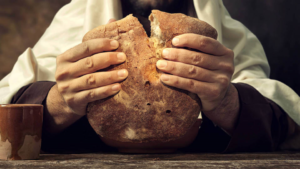
Give us this day our daily Bread
Matthew 6:11 says, “Give us this day, our daily bread”
On Sunday, Dad focused on this scripture. He pointed out 3 things:
1. The Source (Give Us) 2. The Schedule (this day) 3. The Substance (Our Daily Bread)
We are to fully rely on the Lord for all our needs. God alone is our provider. Dad gave us examples in scripture where God delivered food to Elijah by ravens, and other examples of Gods miraculous provision. As well as present miracles God provided for us here, at Word of Faith, in the days after the enormous disaster Hurricane Katrina. God was our provider. Sending food and supplies from all over America by the hands of HIS people.
A beautiful reminder
We were reminded on Sunday that no matter what our circumstances may look like, the Lord will provide for us. (If we belong to Him) He used encouraging scriptures such as:
Hebrews 13:5-6 “I will never leave you or forsake you”
Matt 6:26-27 look at the birds of the air, they are provided for, aren’t you of much more value than they?
Matt 6:31 Why do you worry about clothing? I will clothe you.
Matt 6:31-34 Don’t worry about what you will eat or drink or wear… Your Father knows what you need. Seek the Kingdom of God and all things will be provided for you.
What a beautiful reminder of God’s awesome power. His ultimate control, and his absolute love for His children that He will “Never leave or forsake us.”
Matthew 6:11, What does it mean?
Below is a commentary on the Matthew 6:11. I enjoyed reading it and I thought you might too. It seemed to be an encouraging finishing seal on the reminder God has sent to us.
Read it below.
“This part of the Sermon on the Mount (Matthew 5:1–2) presents a model prayer. Jesus is using this as an example, to counter the faulty prayer methods He has just discussed (Matthew 6:5–8). He opened His prayer with the focus on God the Father and His holy name. The first request was for God’s kingdom to come and for His will to be done on earth as in heaven (Matthew 6:9–10).
“Bread”
Some commentators in history have suggested that the “bread” mentioned here is supposed to mean the spiritual food of the Word of God. Most interpreters insist Jesus is, in fact, referring to physical food. Where “bread” is a shorthand, here, would be in reference to a person’s most basic and important needs.
Bread for us today vs. for Ancient Jews
In the modern era, many people—especially in the west—resist eating bread in order to be healthy or lose weight. Focusing too much on wheat, loaves, and This part of the Sermon on the Mount (Matthew 5:1–2) presents a model prayer. Jesus is using this as an example, to counter the faulty prayer methods He has just discussed (Matthew 6:5–8). He opened His prayer with the focus on God the Father and His holy name. The first request was for God’s kingdom to come and for His will to be done on earth as in heaven (Matthew 6:9–10).
such makes it difficult to grasp the dependence expressed by this prayer. This is especially true for those who have never had to wonder if they would be able to feed themselves, or their families on the following day. Many in the world, unfortunately, face that very challenge. Most of Jesus listeners, even if they weren’t desperately poor, knew what it was like to face uncertainty in their basic needs.
Ancient laborers, including many Jewish people, were paid daily in exchange for their efforts. They often earned just enough to cover basic survival for the following day. Being sick or otherwise missing a day’s wages meant genuine danger for them and those dependent on them.
We are not meant to ask of God frivolously
Jesus did not instruct His followers to pray for a one-time permanent solution to their daily needs. He did not tell believers to ask for enough money to forever guarantee they could feed their families for days or weeks or years. The point Jesus makes here is to pray in dependence on the Father; to ask Him to meet the needs of each day. In doing so, He destroyed any idea that believers should be mostly self-reliant, checking in with God only when faced with a critical need. Instead, Jesus showed clearly that every child of God must be God-reliant for every need on every day.
In fact, whether we choose to acknowledge it or not, we are reliant on God for all things at all time. Every good gift we receive comes from Him and not from ourselves (James 1:17). The prayer for our daily bread is the humble expression that we understand that to be true.
The difference between “needs” and “wants”
This concept of “daily bread” provides important context when Jesus speaks about anxiety later in this chapter (Matthew 6:25–26). Parents often teach children the difference between “needs” and “wants.” It’s good to note the difference between survival and luxury. At the same time, dependence on God means realizing that what we “need” relates directly to His will, and His plans (Matthew 6:10). What we truly “need” is defined according to the purposes God has for us in that moment, as difficult as that can be to accept.”

